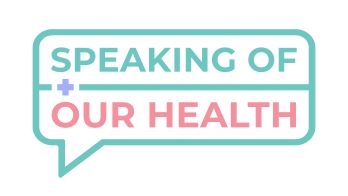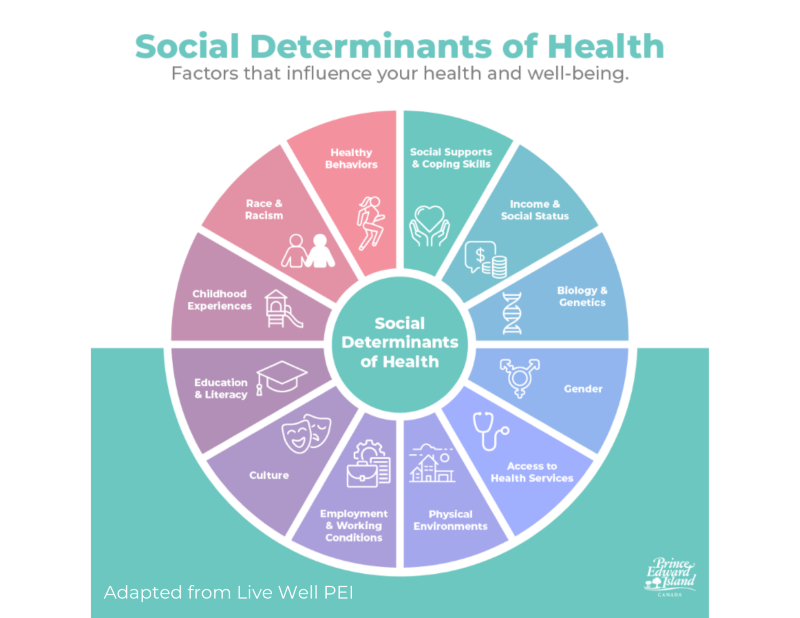Look for the Speaking of Our Health campaign on social media, to raise awareness of the unique health needs and challenges of women and gender diverse people in PEI.
About the Campaign

When it comes to health and well-being on PEI, there's a lot to talk about. And the conversation goes far beyond healthcare.
When we speak about the health needs of women and gender-diverse people, we are not just talking about health issues related to reproductive organs and gender-affirming care.
Both biological sex differences and gender differences can impact a person's health outcomes.
When it comes to biology, some health issues show up differently in females compared to males. For instance, when females have a heart attack, they might have symptoms like trouble breathing, back pain, nausea, and vomiting, which are different from what males experience.
When it comes to gender, women and gender-diverse people have higher rates of mental health issues such as trauma, gender dysphoria for transgender people, and anxiety. Many of these health conditions are impacted by the social determinants of health.
What is a Social Determinant of Health?
Social determinants of health are the non-medical factors that influence one's overall health. They include things like income, race, employment, housing status, education, disability, sexuality and gender.
Download the Social Determinants of Health - Factors that influence your health and well-being graphic. Graphic inspired by Live Well.
Visit Live Well for more information on the Social Determinants of Health.
Let's talk about Gender as a Social Determinant of Health.
Gender refers to the socially constructed roles, behaviours, expressions and identities of girls, women, boys, men, and gender-diverse people.
Gender influences how people perceive themselves and each other, and how they act and interact. It also influences the distribution of power and resources in society.
Gender stereotypes and norms all play a part in how likely people are to get sick, how they experience illness, how they access health services, and how they are treated when seeking healthcare.
When combined with other social determinants like income (women typically make less money than men) and caregiver responsibilities (which often fall on women), it creates situations where women and gender-diverse people often face unique challenges and barriers when accessing health services, compared to men and cisgender Islanders.
This health gap is even wider for women in marginalized and disadvantaged communities.
So many factors shape our health and well-being, for better or worse, such as a sense of belonging, acceptance, having enough money, early childhood experiences, working and living conditions, experiences of racism, and more.
The Gender Health Gap exists because the healthcare system traditionally hasn't considered the impact of these physiological differences, cultural challenges, and life circumstances when it comes to health.
It's time to change that.
Talking about health issues can be uncomfortable, but education and communication are the first steps in creating an equitable healthcare system.
The Speaking of Our Health campaign aims to raise awareness about the unique health issues and barriers women and gender-diverse people face and start a conversation on how we can support health and well-being for all.
This campaign is a part of the Government of PEI’s Health Strategy for Women and Islanders Who Are Gender Diverse, and its goal is for optimal health and well-being for women and Islanders who are gender diverse at every stage of their lives.
Removing the Stigma
To have an open and honest conversation about the gender health gap, we must remove its stigma. This means challenging negative beliefs, attitudes, and stereotypes about health disparities for women and gender-diverse individuals.
Removing stigma is crucial because it helps to:
- Achieve better health outcomes for all individuals, regardless of gender identity.
- Foster a healthier and more equitable society.
- Address gender disparities in health outcomes and reduce social and economic inequalities.
- Empower individuals to make informed healthcare choices, preserving their autonomy.
- Ensure inclusive and unbiased healthcare for all.
- Advance research and treatment for gender-specific conditions.
- Improve mental health services and overall well-being.
- Establish equal access to care, promoting early detection and prevention.
View our social media campaign
Join the Conversation
Get involved and use your voice to speak up about our health!
- Follow us on social media
- Use our hashtag #SpeakingOfOurHealth
- Contact Us

